| Listing 1 - 7 of 7 |
Sort by
|
Book
ISBN: 9789004169913 9004169911 9786613061232 904743384X 1283061236 9789047433842 Year: 2008 Volume: 298 7 Publisher: Boston Brill
Abstract | Keywords | Export | Availability | Bookmark
 Loading...
Loading...Choose an application
- Reference Manager
- EndNote
- RefWorks (Direct export to RefWorks)
The volume represents the seventh in the series on Orality and Literacy in the Ancient Greek and Roman Worlds. It comprises a collection of essays on the significance and working of memory in ancient texts and visual documentation, from contexts both oral (or oral-derived) and literate. The authors discuss a variety of interpretations of ‘memory’ in Homeric epic, lyric poetry, tragedy, historical inscriptions, oratory, and philosophy, as well as in the replication of ancient artworks, and in Greek vase inscriptions. They present therefore a wide-ranging analysis of memory as a fundamental faculty underlying the production and reception of texts and material documentation in a society that gradually moved from an essentially oral to an essentially literate culture.
Classical literature --- Language and culture --- Oral tradition in literature. --- Literacy --- Littérature ancienne --- Langage et culture --- Tradition orale dans la littérature --- Alphabétisation --- History and criticism. --- Histoire et critique --- Oral tradition in literature --- History and criticism --- Classical literature -- History and criticism. --- Language and culture -- Greece. --- Language and culture -- Rome. --- Literacy -- Greece. --- Literacy -- Rome. --- Languages & Literatures --- Greek & Latin Languages & Literatures --- Littérature ancienne --- Tradition orale dans la littérature --- Alphabétisation --- Illiteracy --- Education --- General education --- Culture and language --- Culture --- Classical literature - History and criticism --- Language and culture - Greece --- Language and culture - Rome --- Literacy - Greece --- Literacy - Rome
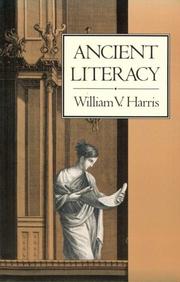
ISBN: 0674038371 9780674038370 9780674033818 0674033817 9780674033801 0674033809 Year: 1989 Publisher: Cambridge (Mass.): Harvard university press,
Abstract | Keywords | Export | Availability | Bookmark
 Loading...
Loading...Choose an application
- Reference Manager
- EndNote
- RefWorks (Direct export to RefWorks)
How many people could read and write in the ancient world of the Greeks and Romans? No one has previously tried to give a systematic answer to this question. Most historians who have considered the problem at all have given optimistic assessments, since they have been impressed by large bodies of ancient written material such as the graffiti at Pompeii. They have also been influenced by a tendency to idealize the Greek and Roman world and its educational system. In Ancient Literacy W. V. Harris provides the first thorough exploration of the levels, types, and functions of literacy in the classical world, from the invention of the Greek alphabet about 800 B.C. down to the fifth century A.D. Investigations of other societies show that literacy ceases to be the accomplishment of a small elite only in specific circumstances. Harris argues that the social and technological conditions of the ancient world were such as to make mass literacy unthinkable. Noting that a society on the verge of mass literacy always possesses an elaborate school system, Harris stresses the limitations of Greek and Roman schooling, pointing out the meagerness of funding for elementary education. Neither the Greeks nor the Romans came anywhere near to completing the transition to a modern kind of written culture. They relied more heavily on oral communication than has generally been imagined. Harris examines the partial transition to written culture, taking into consideration the economic sphere and everyday life, as well as law, politics, administration, and religion. He has much to say also about the circulation of literary texts throughout classical antiquity. The limited spread of literacy in the classical world had diverse effects. It gave some stimulus to critical thought and assisted the accumulation of knowledge, and the minority that did learn to read and write was to some extent able to assert itself politically. The written word was also an instrument of power, and its use was indispensable for the construction and maintenance of empires. Most intriguing is the role of writing in the new religious culture of the late Roman Empire, in which it was more and more revered but less and less practiced. Harris explores these and related themes in this highly original work of social and cultural history. Ancient Literacy is important reading for anyone interested in the classical world, the problem of literacy, or the history of the written word.
Classical languages --- Literacy --- Civilization, Classical. --- Language and culture --- Culture and language --- Culture --- Classical civilization --- Civilization, Ancient --- Classicism --- Illiteracy --- Education --- General education --- Dead languages --- Languages, Classical --- History. --- Classical languages. --- Langues anciennes --- Langage et culture --- Alphabétisation --- 87 --- 930.85 --- 87 Klassieke literatuur --- Klassieke literatuur --- 930.85 Cultuurgeschiedenis. Kultuurgeschiedenis --- Cultuurgeschiedenis. Kultuurgeschiedenis --- History --- Greece --- Rome --- Civilization [Classical ] --- Language and culture - Greece. --- Language and culture - Rome. --- Literacy - Greece. --- Literacy - Rome.
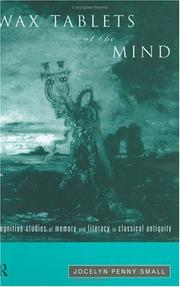
ISBN: 0415149835 9780415149839 Year: 1997 Publisher: London: Routledge,
Abstract | Keywords | Export | Availability | Bookmark
 Loading...
Loading...Choose an application
- Reference Manager
- EndNote
- RefWorks (Direct export to RefWorks)
Cognition and culture --- Memory --- Literacy --- Cognition et culture --- Mémoire --- Alphabétisation --- History --- Histoire --- Oral tradition --- Memory. --- 159.953 --- 1 <37/38> --- -Cognition and culture --- -Literacy --- -Memory --- Retention (Psychology) --- Intellect --- Psychology --- Thought and thinking --- Comprehension --- Executive functions (Neuropsychology) --- Mnemonics --- Perseveration (Psychology) --- Reproduction (Psychology) --- Illiteracy --- Education --- General education --- Culture and cognition --- Cognition --- Culture --- Ethnophilosophy --- Ethnopsychology --- Socialization --- Geheugen. Herinnering --- Filosofie: klassieke oudheid --- 1 <37/38> Filosofie: klassieke oudheid --- 159.953 Geheugen. Herinnering --- Mémoire --- Alphabétisation --- Tradition, Oral --- Oral communication --- Folklore --- Oral history --- History. --- Cognition and culture - Greece. --- Cognition and culture - Rome. --- Oral tradition - Greece. --- Oral tradition - Rome. --- Literacy - Greece. --- Literacy - Rome.
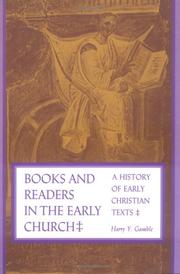
ISBN: 0300060246 0300069189 9780300060249 9780300069181 Year: 1995 Publisher: New Haven: Yale university press,
Abstract | Keywords | Export | Availability | Bookmark
 Loading...
Loading...Choose an application
- Reference Manager
- EndNote
- RefWorks (Direct export to RefWorks)
Book history
---
Christian church history
---
Patrology
---
anno 500-1499
---
anno 400-499
---
Christian literature, Early
---
Christians
---
Literacy
---
Church libraries
---
Christian libraries
---
Church history
---
Books and reading
---
Books
---
Latin authors
---
History and criticism
---
091 =71
---
028
---
02 <09> <37>
---
02 <09> <38>
---
27 "00/05"
---
#BIBC:ruil
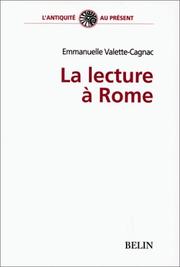
ISSN: 12575887 ISBN: 2701116112 9782701116112 Year: 1997 Publisher: Paris: Belin,
Abstract | Keywords | Export | Availability | Bookmark
 Loading...
Loading...Choose an application
- Reference Manager
- EndNote
- RefWorks (Direct export to RefWorks)
Latin language --- Transmission of texts --- Written communication --- Rites and ceremonies --- Language and culture --- Books and reading --- Inscriptions, Latin. --- Paleography, Latin. --- Literacy --- Social aspects --- Written Latin. --- 028 --- 02 <09> <37> --- Lezen. Lectuur --- Bibliotheekwezen:--algemene geschiedenis--Rome. Oud-Italië --- 02 <09> <37> Bibliotheekwezen:--algemene geschiedenis--Rome. Oud-Italië --- 028 Lezen. Lectuur --- Reading --- Literature and society --- Lecture --- Littérature et société --- Rome --- Intellectual life. --- Vie intellectuelle --- Littérature et société --- Inscriptions, Latin --- Paleography, Latin --- Written Latin --- Illiteracy --- Education --- General education --- Classical languages --- Italic languages and dialects --- Classical philology --- Latin philology --- Written discourse --- Written language --- Communication --- Discourse analysis --- Language and languages --- Visual communication --- Culture and language --- Culture --- Latin inscriptions --- Latin language - Social aspects - Rome. --- Latin language - Written Latin. --- Transmission of texts - Rome. --- Written communication - Rome. --- Rites and ceremonies - Rome. --- Language and culture - Rome. --- Books and reading - Rome. --- Literacy - Rome.
Book
ISBN: 9780567662880 0567662888 9780567662897 9780567684226 Year: 2018 Volume: 541 Publisher: New York: Bloomsbury,
Abstract | Keywords | Export | Availability | Bookmark
 Loading...
Loading...Choose an application
- Reference Manager
- EndNote
- RefWorks (Direct export to RefWorks)
Allen Hilton examines how pagan critics ridiculed the early Christians for being uneducated, and how a few literate Christians took up pen to defend the illiterate members of their churches. Hilton sheds light on the peculiarity of this “defense”, in which the authors openly admit that the critics have the facts on their side, noting that the Book of Acts even calls two of its heroes, Peter and John, illiterates. Why did the authors of these biblical texts, intent on presenting Christianity in a positive light, volunteer such a negative detail? The answer to this question reveals a fascinating social exchange that first surrounded education levels in antiquity, and proceeded to make its way into the New Testament. This volume provides context for pagan education as opposed to early Christian illiteracy – touching upon the methods of ancient learning and the relationship between Christian and pagan schools – and analyses the 'uneducated virtue' of the Apostles. Hilton provides a useful window onto the social construction of ancient education and ushers readers into the everyday experience of ancient Christians, and those who disdained and defended them.
Church history --- Christians --- Literacy --- Books and reading --- Christian literature, Early --- 225.08*8 --- 225.08*8 Theologie van het Nieuwe Testament: relatie met de klassieke oudheid --- Theologie van het Nieuwe Testament: relatie met de klassieke oudheid --- Illiteracy --- Education --- General education --- Apostolic Church --- Christianity --- Church, Apostolic --- Early Christianity --- Early church --- Primitive and early church --- Primitive Christianity --- Fathers of the church --- Great Apostasy (Mormon doctrine) --- Religious aspects&delete& --- Christianity&delete& --- History --- Social aspects --- History and criticism --- Religious aspects --- History. --- History and criticism. --- Church history - Primitive and early church, ca. 30-600. --- Christians - Books and reading - Rome. --- Literacy - Religious aspects - Christianity - History. --- Literacy - Rome - History. --- Literacy - Social aspects - Rome. --- Books and reading - Rome. --- Christian literature, Early - History and criticism.
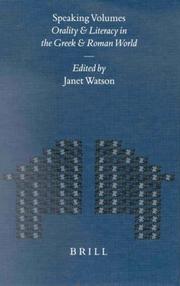
ISBN: 9004120491 9004351027 9789004120495 9789004351028 Year: 2001 Volume: 218 Publisher: Boston Brill.
Abstract | Keywords | Export | Availability | Bookmark
 Loading...
Loading...Choose an application
- Reference Manager
- EndNote
- RefWorks (Direct export to RefWorks)
This volume examines orality and literacy in the ancient Greek and Roman world through a range of perspectives and in various genres. Four essays on the Homeric epics present recent research into performative aspects of language, cognitive theory and oral composition, a re-evaluation of Parry's oral-formulaic theory, and a new perspective on the poem's transmission. These are complemented by studies of the oral nature of Greek proverbial expressions, and of poetic authority within a fluid oral tradition. Two essays consider the significance of the written word in a predominantly oral culture, in relation to star calendars and to Panathenaic inscriptions. Finally, two chapters consider the ongoing influence of oral tradition in the ancient novel and in Roman declamation. These essays illustrate the importance of considering ancient texts in the context of fluctuating oral and literate influences.
Oral tradition --- Literacy --- Language and culture --- Classical literature --- Oral-formulaic analysis --- Tradition orale --- Alphabétisation --- Langage et culture --- Littérature ancienne --- Analyse des formules orales --- History and criticism --- Histoire et critique --- Literary form --- Oral-formulaic analysis. --- History and criticism. --- History --- -Language and culture --- -Literacy --- -Oral tradition --- -Oral-formulaic analysis --- -Form, Literary --- Forms, Literary --- Forms of literature --- Genre (Literature) --- Genre, Literary --- Genres, Literary --- Genres of literature --- Literary forms --- Literary genetics --- Literary genres --- Literary types (Genres) --- Literature --- Formulaic analysis, Oral --- Folk literature --- Folklore --- Tradition, Oral --- Oral communication --- Oral history --- Illiteracy --- Education --- General education --- Culture and language --- Culture --- Literature, Classical --- Literature, Ancient --- Greek literature --- Latin literature --- -History and criticism --- Methodology --- Homer --- -Technique --- -Homer --- -Hóiméar --- Hūmīrūs --- Homeros --- Homerus --- Gomer --- Omir --- Omer --- Omero --- Ho-ma --- Homa --- Homérosz --- האמער --- הומירוס --- הומר --- הומרוס --- هومر --- هوميروس --- 荷马 --- Ὅμηρος --- Гамэр --- Hamėr --- Омир --- Homero --- 호메로스 --- Homerosŭ --- Homērs --- Homeras --- Хомер --- ホメーロス --- ホメロス --- Гомер --- Homeri --- Hema --- Pseudo-Homer --- Pseudo Omero --- Technique --- -Formulaic analysis, Oral --- Form, Literary --- Homère --- Alphabétisation --- Littérature ancienne --- Technique. --- Hóiméar --- Classical literature - History and criticism. --- Literary form - History - To 1500. --- Language and culture - Greece. --- Language and culture - Rome. --- Oral tradition - Greece. --- Oral tradition - Rome. --- Literacy - Greece. --- Literacy - Rome.
| Listing 1 - 7 of 7 |
Sort by
|

 Search
Search Feedback
Feedback About UniCat
About UniCat  Help
Help News
News